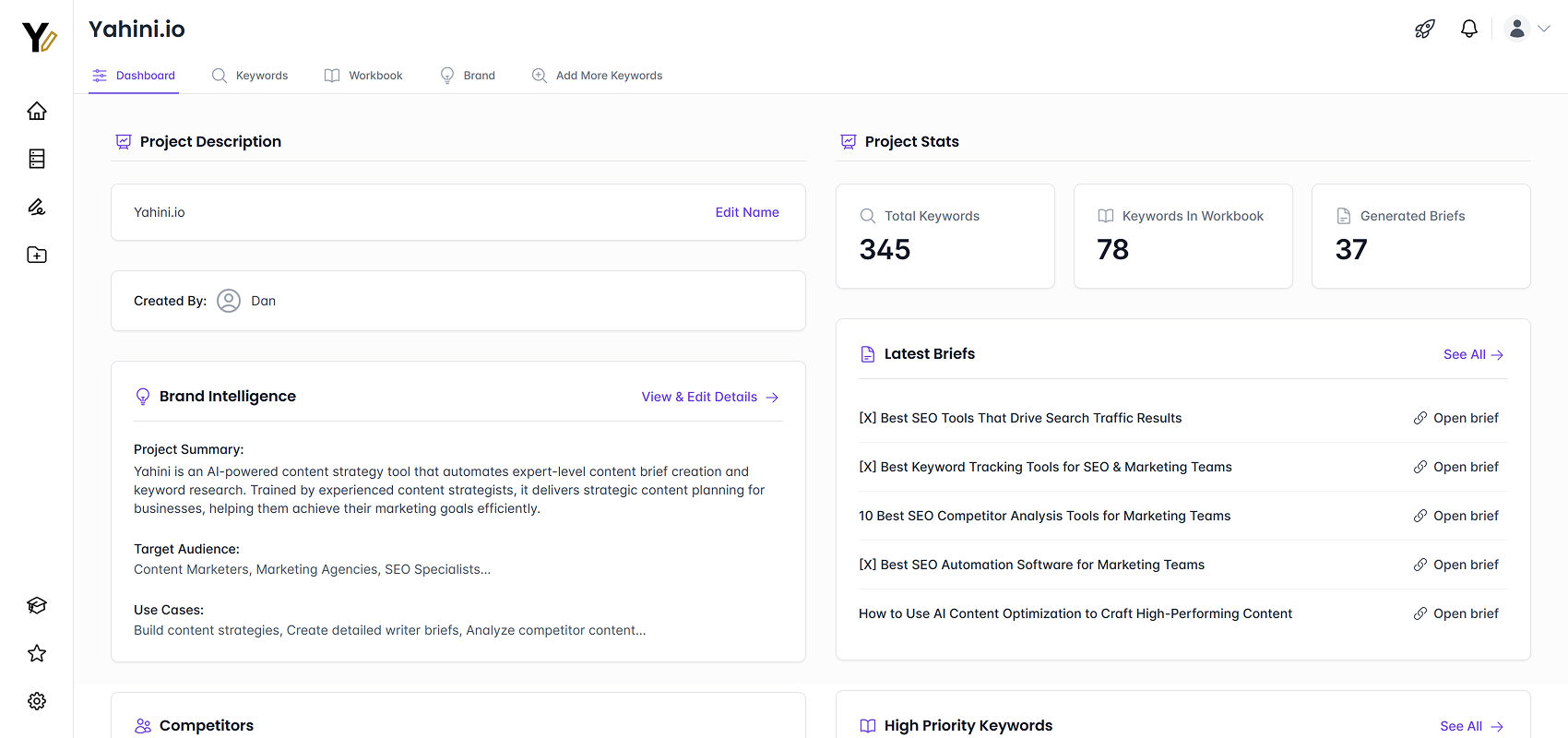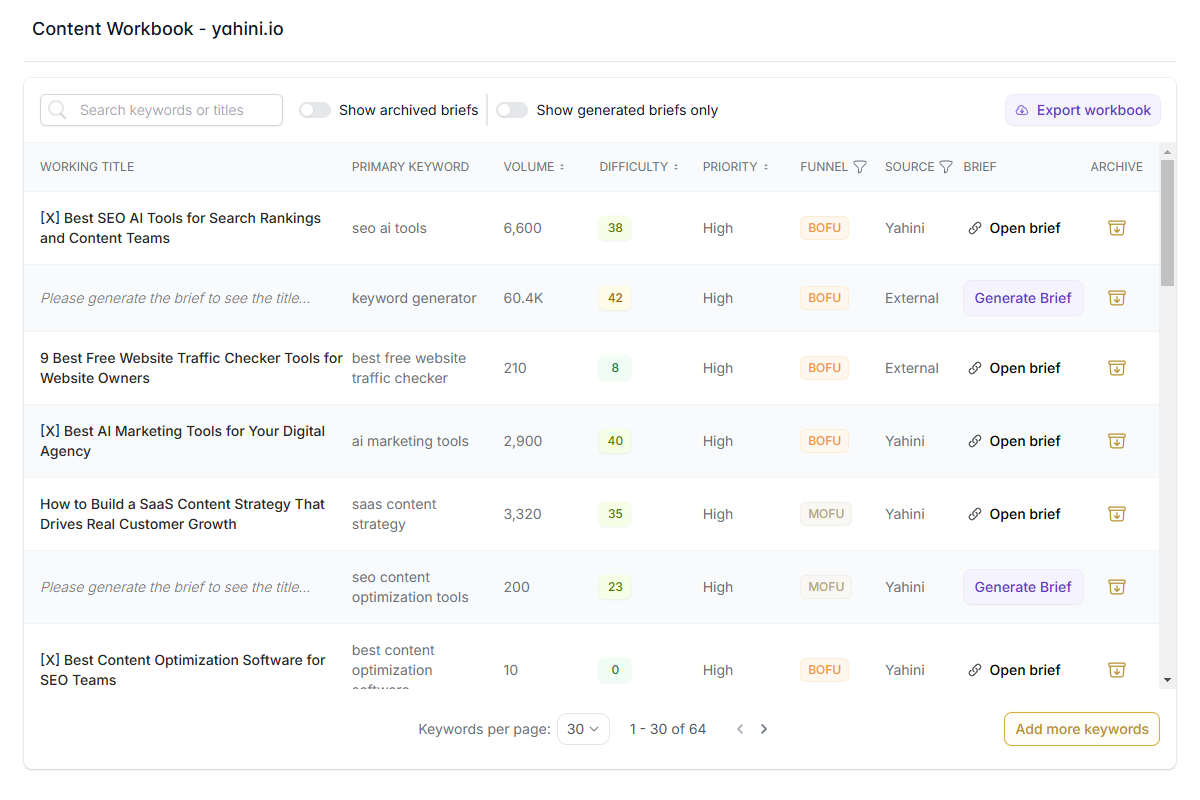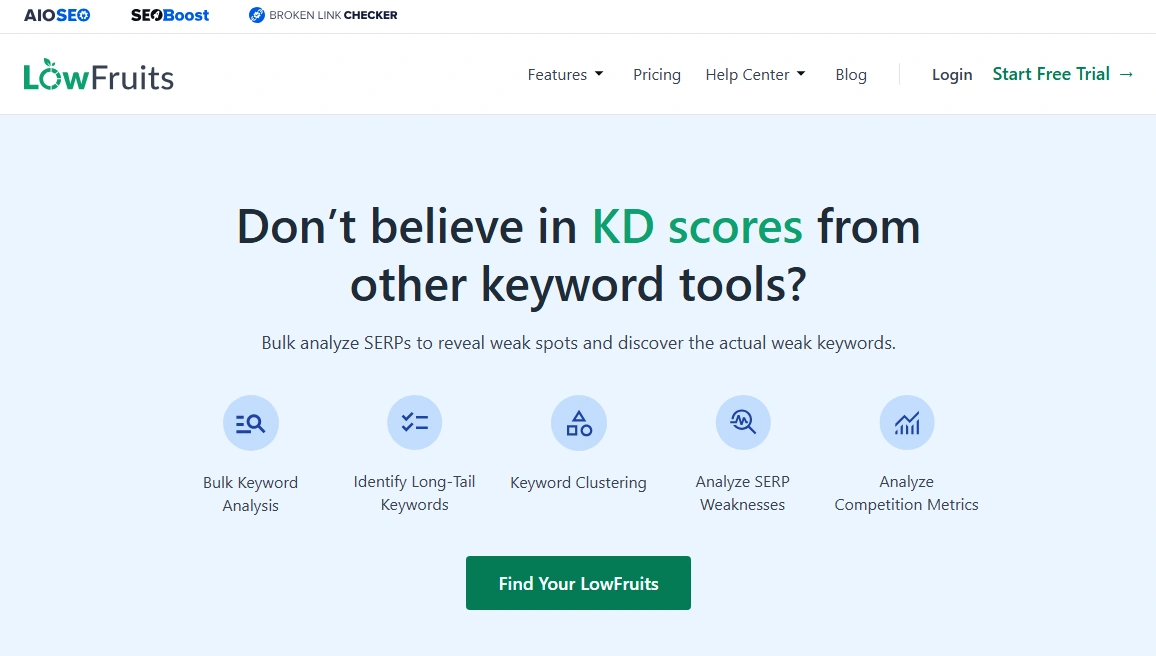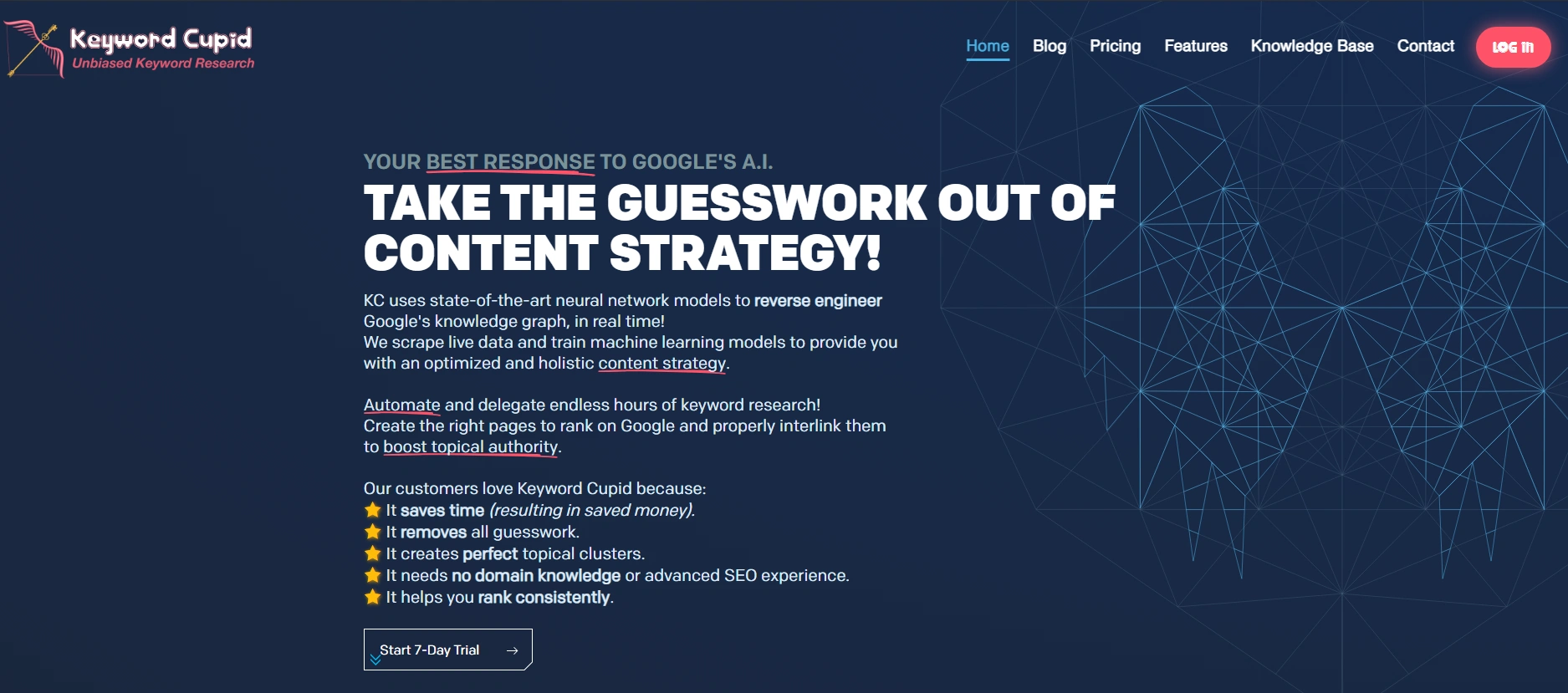
The Best AI Keyword Generator Tools to Find Hundreds of Business-Specific Topics

Co-Founder / CTO
The spreadsheet blurs. Rows of keywords, search volumes, and keyword difficulty scores stretch into what feels like infinity. You’ve spent hours, maybe days, pulling data from Google Search Console or another keyword tool, but the path forward remains stubbornly unclear.
This is the quiet frustration of modern content marketing.

It's no surprise that 33% of content marketers struggle with measuring content effectiveness (Content Marketing Institute, 2023). When your keyword process is disconnected from business goals, ROI becomes a guessing game.
Finding keywords is not the problem; the internet is drowning in them. The real challenge is knowing which ones matter and, more importantly, what to do with them to attract the right target audience.
A good AI keyword tool offers to cut through the noise, moving beyond simple lists to provide genuine strategic direction for getting found on search engines. But not all AI is created equal. Some give you data. Others give you a plan.
This guide will show you the difference, helping you understand how to use these tools for better search rankings. We'll look at the top AI keyword tool options on the market, helping you choose the one that will build a content strategy that drives meaningful growth for your business.
Disclaimer: At Yahini, we spend a ton of time testing, researching and using various tools to figure out which ones are worth recommending, evaluating them based on what they’re supposed to do and how well they meet our criteria. We do not accept payment for featuring a tool in our articles or linking to a site. Our recommendations are 100% authentic and unbiased, because we believe you deserve nothing less.
Table of Contents
Yahini

Most tools that call themselves “AI keyword generators” are fundamentally data finders, providing basic keyword suggestions and metrics.
Yahini is built on a different premise. It is a complete content strategy platform, designed to convert raw data into a clear, actionable content roadmap. Its primary job is to show you exactly how to use them to achieve your business goals on any search engine.
Build a content roadmap

An unorganized, context-free keyword list is a liability, not an asset. It creates analysis paralysis and leads to 'random acts of content' that aren't tied to a cohesive strategy. It creates analysis paralysis. A content roadmap, on the other hand, provides direction. If you're struggling to nail your content strategy, this is the element you need.
It analyzes your website, your competitors, and your unique value proposition (and how they perform on major search engines) to generate a full-funnel content plan automatically.
Consider a B2B SaaS company that sells project management software. Manually, they would spend weeks trying to figure out what topics to cover. With Yahini, the process takes minutes. Yahini analyzes their site and might identify a critical gap: they have plenty of bottom-of-funnel content about their features but almost nothing for potential customers who are just starting to realize their current methods are inefficient.
This is where Yahini’s automated funnel mapping becomes invaluable. It generates a thorough keyword list and categorizes them by user intent across the marketing funnel.
-
Top-of-Funnel (TOFU): Keywords like “signs of poor team collaboration” (This is a critical gap because without that 'Top-of-Funnel' content, your business is completely invisible to a huge pool of potential customers who don't yet know a solution like theirs even exists.)
-
Middle-of-Funnel (MOFU): Terms such as “how to implement project management methodologies”.
-
Bottom-of-Funnel (BOFU): High-intent queries like “[Your Software Name] pricing” or “is [Your Software Name] good for small teams.

This automatic organization of your content strategy saves dozens of hours otherwise spent in spreadsheets, manually cross-referencing keywords with audience awareness stages. You instantly see where your content gaps are and get the exact topics needed to fill them, creating a clear path to generating sustainable organic traffic.
This is the essence of a funnel-focused approach to content, ensuring you create a clear path to generating sustainable organic traffic.

Get actionable content briefs instantly
Finding the right keyword is only the first step. The next hurdle is turning that keyword into a high-quality writing assignment. This is often where content quality breaks down. Yahini solves this by generating expert, AI-powered content briefs with a single click.
For any keyword it identifies, Yahini analyzes the top-ranking search engine results page (SERP) and uses its strategist-trained AI* to produce a comprehensive brief. The difference between this and a generic prompt is significant; in fact, we ran an experiment to prove it.
* Unlike standard AI that just scrapes SERPs, Yahini's AI is trained on thousands of successful content strategies. It learns to recognize the patterns that lead to conversions, not just rankings, mimicking the decision-making process of an expert human strategist.
Filter strategically to find hidden wins
Standard keyword metrics like search volume and keyword difficulty are useful, but they don't tell the whole story. A high-volume keyword might attract the wrong audience, and a low-difficulty keyword might have zero business value.
Yahini’s expert-trained AI model goes further, allowing you to filter for true business relevance. Its proprietary scoring system* helps you find keywords that other tools miss.
* This isn't just keyword difficulty. Tahini’s 'Business Relevance' score factors in transactional intent, audience awareness level, and your site's unique authority to pinpoint keywords that will actually drive revenue.
LowFruits

Overview
LowFruits is a specialized tool laser-focused on one thing: finding low-competition keywords, or the "low-hanging fruit" of search.
Key Features for Keyword Generation
Its core function is analyzing the SERPs (the pages a search engine shows after a user's query) for weaknesses. It looks for search results pages populated by forum posts (like Quora or Reddit) or sites with low domain authority.
When SERPs are filled with user-generated content from forums like Reddit, it’s a strong signal to Google that no one has created a definitive, high-quality resource to answer that query yet. This is your opening.
When it finds them, it flags the long-tail keywords as an opportunity you can likely rank for quickly. Often, these are long-tail keywords that larger competitors ignore but which can drive highly targeted traffic.
For example, a Google Search for “best cold brew coffee maker for small kitchen” might show forum discussions on page one, a signal LowFruits would highlight as a winnable keyword.
Pricing
LowFruits typically uses a credit-based system or offers monthly plans starting around $21/month.
Where It Falls Short
Its strength is its weakness. LowFruits is excellent for spotting easy wins but offers no help in building a cohesive content strategy. It doesn't cluster topics, map keywords to a marketing funnel, or generate briefs. It finds opportunities but leaves the strategic planning entirely up to you. It is a niche keyword tool, not a complete content planner.
Keyword Cupid

Overview
Keyword Cupid uses AI to solve a different problem: topic organization. It performs detailed keyword analysis to take a keyword list and group them into logical clusters to help you build topical authority.
It excels at the post-research step of clustering. For teams that already have a data source and a separate briefing process, it can be a valuable part of the toolkit. The challenge remains in prioritizing those clusters against business goals and turning them into actionable briefs, steps that still require significant manual work.
Key Features for Keyword Generation
The tool analyzes Google Search results to understand which keywords are consistently ranking together. Based on this, it groups semantically related terms.
For instance, if you provide the seed keyword “email marketing,” it will generate clusters like “email marketing platforms,” “email marketing best practices,” and “how to build an email list.” This is a powerful way to plan pillar pages and topic clusters, which strengthens your site's architecture through internal links.
Pricing
Pricing is often based on credits or reports, with plans starting around $9.99/month for a set number of credits.
Where It Falls Short
Keyword Cupid is a valuable intermediary tool, not an end-to-end solution. It organizes your keywords beautifully, but that’s where its job ends. This means the most time-consuming parts of keyword research (prioritizing those clusters, mapping them to your business goals, and manually creating a detailed content brief for every single article) are still your responsibility.
The DIY Approach: Using LLMs for Keyword Research
You can also use general-purpose Large Language Models (LLMs) like ChatGPT or Claude for keyword research. The process is straightforward but requires heavy manual intervention.
-
Generate Seed Keyword Ideas: Start with a broad prompt. “Act as a content strategist. Give me 20 long-tail keywords or keyword ideas for a blog about sustainable fashion that will rank on Google Search.”
-
Uncover User Intent: Follow up with another prompt. “For the list above, sort each keyword by user intent: informational, navigational, or commercial.”
-
Find Related Questions: Use a third prompt. “What are common questions people ask when shopping for ethical clothing brands?"
Where It Falls Short
This approach has major limitations. LLMs have no access to real-time search volume or keyword difficulty data. They can “hallucinate” keywords that have no search demand, creating wasted effort. This form of keyword research provides raw ideas, not a dependable strategy, leading some to ask if ChatGPT is making content strategy dumber.
You might ask ChatGPT for keywords for a vegan leather bag company, and it could suggest 'best plant-based polyurethane handbag for winter.' This sounds plausible, but a quick check in a data-backed tool would reveal it has zero monthly searches, meaning you’d waste time and money creating content no one will ever find.
The entire process of verifying data, removing duds, organizing the keepers into a plan, and building briefs remains a slow, manual task. This form of keyword research provides raw ideas, not a dependable strategy.
AI Content Tools with Keyword Features
Some AI-powered content optimization and writing platforms include keyword research features. These functions are typically designed to support the tool's primary purpose, not to serve as a standalone strategy engine for a search engine.
Surfer SEO and NeuronWriter
Overview
These are primarily on-page SEO editors. They analyze top-ranking content and give you suggestions for optimizing your article, from the title tag and meta description to the body copy.
Keyword Functionality
Their keyword research capabilities are focused on finding related terms (often called LSI or NLP keywords) to include within a single article. This helps you cover a topic comprehensively, which is great for on-page optimization. It is not designed for discovering new primary topics or building a broad content plan.
Writesonic and Frase.io
Overview
These platforms are AI writers and content creation assistants. While powerful, it’s important to see these platforms as specialized SEO tools for content creation, not strategy engines.
Keyword Functionality
They use keyword data mainly to inform their AI writing and content briefing features. For example, some tools will analyze competitor content for a given keyword to help structure an AI-generated draft.
This is useful for producing a single piece of content but doesn't provide the high-level, strategic view needed to build a complete content roadmap based on your specific business and website. Its primary purpose is not to serve as a standalone keyword tool for strategy.
How to Choose the Right AI Keyword Generator
Your choice depends entirely on your objective. The decision boils down to one simple question: What is the goal of your keyword research?
Are You Just Finding Keywords, or Building a Strategy?
If your goal is to get a quick list of ideas to experiment with, a simple finder keyword tool or even a general LLM might be enough.
But if your goal is to build a predictable engine for organic growth—content that consistently attracts the right audience and supports your business—you need more than a list. You need a tool that connects keywords to a clear business strategy to drive organic traffic. You need a plan.
What to Look for in a True Content Strategy Tool
When evaluating your options, use this checklist to separate the data finders from the strategy builders.
-
Funnel-Based Planning: Does the tool automatically map keywords to the buyer’s journey (TOFU, MOFU, BOFU) to ensure you’re meeting your audience at every stage?
-
Automated Briefing: Can it instantly transform a chosen keyword into a detailed, ready-to-use content brief, saving your team hours of manual work?
-
Advanced Competitive Analysis Integration: Does it analyze not just why your competitors rank on a search engine, but also the SERP features (like featured snippets, PAA boxes, or video carousels) they are winning, giving you a plan to create superior content?
-
Strategic Filtering: Can you sort and prioritize keyword ideas based on their direct relevance to your business goals, not just on generic metrics like search volume?
Frequently Asked Questions
What exactly is an AI keyword tool?
It is software that uses artificial intelligence to analyze massive amounts of search data. It automates the process of discovering relevant keywords, generating keyword suggestions, understanding the intent behind a search, and, in advanced cases, helps organize these keywords into a workable content plan.
Can an AI keyword generator really improve SEO?
Yes! A good keyword tool can dramatically improve your search rankings. A persistent challenge in SEO is targeting the right search queries for a specific search engine. Targeting these specific user needs is a proven path to success, as content marketing generates 3x more leads and costs 62% less than outbound marketing. Long-tail keywords, in particular, are proven to have higher click-through rates due to their ability to match user intent closely.
Ready to Build a Content Roadmap, Not Just a Keyword List?
Publishing quality content demands a smart, efficient plan that connects every piece of content directly to a business objective.
Many tools can give you data. Yahini is designed to give you a roadmap, optimizing your entire keyword research process. For founders, content marketers, and agencies focused on saving time and driving real results, it is the smartest choice for turning keywords into a powerful engine for growth.
Ditch the generic outlines! Sign up now.
1. Need a 24/7 content strategist? See how Yahini can help you craft perfect content briefs.
2. Any questions? I’m happy to help! Just reach out on LinkedIn.
3. Not ready yet? Learn more about Yahini here.